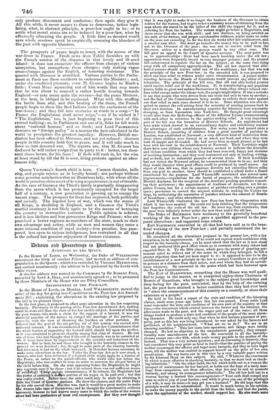The prospects of peace begin to lower, with the access
of the war-fever in France. Fresh news from Tahiti furnishes us with the French version of the disputes in that lovely and ill-used island : it does not exonerate the officers from charges of violent usurpation, but strengthens those charges; only making vague
cross-charges against the English, of fostering resistance. The quarrel with Morocco is unsettled. Various parties in the Parliament at Paris use these accidents to embarrass the Ministry ; and, under the combined pressure, even M. GUIZOT begins to flinch a little; Count MOLE squeezing out of him words that may mean that he was about to counsel a rather hostile bearing towards England—or may mean quite the reverse—but the peace Minister, at the best, is obliged to be equivocal. What with this snuffing the battle from afar, and this beating of the drum, the French people begin to show like Red Indians under the excitement of the war-dance ; and they fall into ecstacies at words in a song—" In France the Englishman shall never reign,"—as if he wished it ! "The Englishman," too, is just beginning to grow tired of this eternal bullying : so, in Parliament and out of it, folks let fall words about "national honour," and so forth ; and Lord PALMERSTON descants on "foreign policy" in a manner the best calculated in the world to precipitate the greatest impolicy. However, British mediation has been offered to Morocco, and not yet refused : discreet people in this country hold fast to peace, and it will take much to force us into detested war. The reports are, that M. Gomm. has declared he will rather resign than be party to it : better, ten thousand times better, for his fame ! If fools will rush in, let the wise at least stand by till the tit is over, living protests against an obsolescent folly.


























 Previous page
Previous page